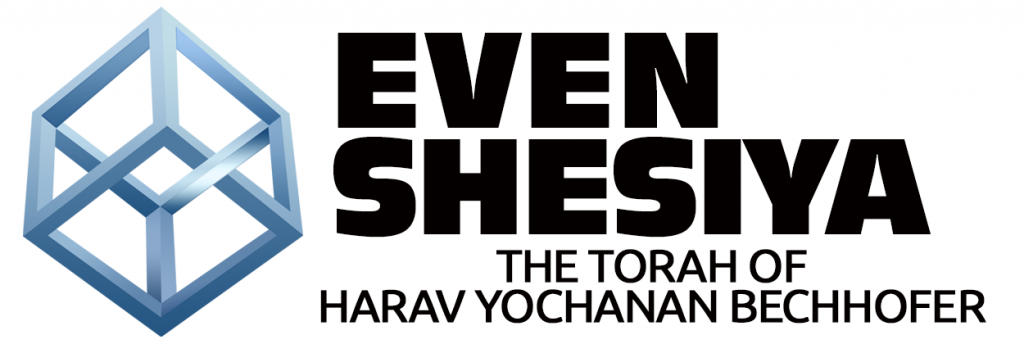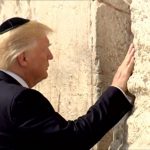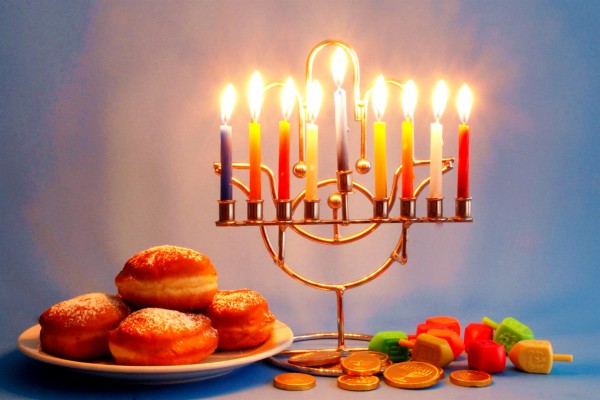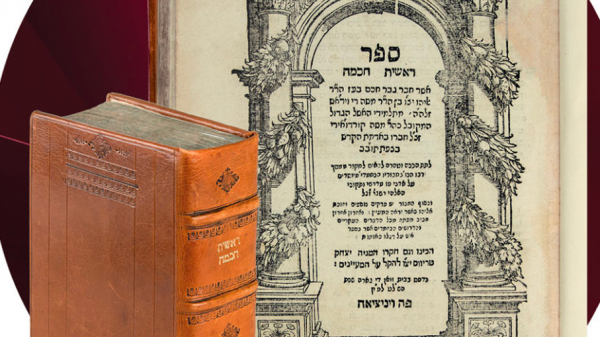Click here to download PDF

Affliction & Hunger?!?
“And He afflicted you and He starved you and He fed you the “Mann” that you did not know and was unknown to your forefathers in order to make you know that not on bread alone lives the man but rather on what comes out of the mouth of Hashem lives the man”. This Pasuk at face value begs explanation. Why would eating “Mann”, which tasted like anything anyone thought, be “affliction”? The Torah attests to the fact that everyone got exactly as much as they needed, so in what way were they “starved”? What does it mean that “…the “Mann” was not known to you…”, they were eating it day in and day out for 40 years! How did the “Mann” teach the lesson that “man does not live by bread alone but rather on that what comes out from the mouth of Hashem man lives”?
Was the “Mann” inadequate?
There are commentaries that suggest simply reading the Pasuk as follows: “[Hashem] afflicted you” – by taking you out into the uncertainty of a desert, and then “He starved you”- initially, and then this whole situation was remedied by “feeding you the “Mann” that you did not know” prior to that point in time and “the lesson that man lives by what emerges from Hashem’s mouth” is simply because of Hashem’s command of “let there be “Mann” and sustenance for the Jewish people” from there the Jewish people should extrapolate that that’s where sustenance truly comes from in all situations. This is the simplest way to read the Pasuk with a simple straightforward understanding. However, this is not how the Gemara (Yoma 74b) understands it. The Gemara says they were in affliction and hunger even with the “Mann”. The Gemara explains that since they could not be certain if they would have “Mann” the next day, because all they had in hand was enough for that day, they did not have “bread in the basket” moving forward which makes a person nervous and worried. That is the affliction of uncertainty, “because you cannot compare someone who has bread in the basket [for the future] to someone who does not have bread in the basket”. The “Mann” has a solid track record of appearing every day, so why were they worried if the “Mann” would appear the next day?
Eating with the eyes?!?
The Gemara posits another idea that they remained “hungry” despite eating because you must be able to see what you’re eating to be satisfied. Rashi explains that even though the “Mann” tasted like whatever they willed it to taste like, since it didn’t look like what it was tasting like they could not get fully satisfied. What does one have to do with another? Why does something have to look like what it tastes in order to get full satisfaction? Above all, if the Gemara is correct that they were indeed in the state of agitation and hunger even with the “Mann” then why were they criticized for being disgruntled with the “Mann” and demanding meat fish and other things? Where is the room for criticism if their complaint was true and not imagined? If the affliction and hunger went together with having the “Mann”, then by the same token we could learn “the “Mann” that you did not know” means that they never really knew even after 40 years, but what does that mean? When the Torah says “man does not live by bread alone is that bread literally or as a term referring to all nourishment? since the affliction and hunger was concurrent with their eating the “Mann” how did they actually get to understand the lesson that man lives by what emerges from Hashem’s mouth?
Ignorance is a Name?
“And they called it “Mann” for they did not know what it is” (Shemos ) the stress is they did not know the “Mann” and called it “Mann” for lack of knowledge {see Rashi there) however the Torah adopts that name and considers it the proper name to call this creation. What is the significance of the name “Mann”?
Emes vs Emunah
The famous Midrash Rabbah in Parshas Devarim points out that “Emes”-truth/reality is spelled with “Alef” -the very first letter of the Hebrew alphabet, “Mem”- the middle letter of the Hebrew alphabet, and “Tav”- the final letter of the Hebrew alphabet. What does this mean? My Rebbe Maran HaGaon HaRav Moshe Shapira ZT”L explained that our notion of “Truth” is to see the whole picture from point of origin represented by the “Alef”, the whole series of cause and effect in the middle represented by the “Mem”, and the final conclusion represented by the “Tav”. That is called “to perceive reality”, to have a complete picture and understand why things are as they are and could not be any different. With this my Rebbe went on to explain the term “Emuna”-faith. The root letters of the word are “Alef” the first letter, “Mem” the middle letter, and “Nun” also a middle letter of the Hebrew alphabet. When do you need to have “Emuna”- faith? When you can’t see ahead as to what the future holds. “Alef” represents the solid past that your faith will be predicated on. Ideas that you have known to be true in the past, whether it’s what you were taught by your parents or taught yourself but most of all going back to the original source and origin of all – He who is “Alef”-one. You carry that knowledge and conviction to the present the represented by the “Mem” and “Nun” to proceed forward despite the uncertainties of the future. The faith is fact-based on things that you knew to be true. “V’Emunascha bleilos”-and faith in You at nights – at night you cannot see ahead but you will proceed based on what you know to be true from what you learned or observed during the “daytime”, literally and metaphorically, prior to your current state of darkness and uncertainty.
”Mann”
Based on my Rebbe’s observation we can now understand the secret behind the word “Mann” just the “Men” and “Nun” representing the present with no letters before representing the past or point of origin and no letters following representing seeing the future where things are leading to. The “Mann” came out of nowhere! It was a mystical creation that reappeared every single morning with no tangible point of origin and there was no sense of cause and effect that the Jewish people could sense that would dictate that the “Mann” had to come again tomorrow. It came out of “nowhere” and seemed to be going nowhere because by noon and had all melted and disappeared. The Jews did not know what to make of it and what they called it out of sheer lack of knowledge to encompass and explain the situation and they appropriately called it “Mann” which the Torah agreed to because the “Mann” really came out of “nowhere”. We could now understand the Gemara that says that they had no certainty that they would see it again the next day. There was no detectable cause and effect, no natural cycle of “Mann” that the mind could detect. That’s why even though that had it every single day, day in and day out, since they could not fit into any framework of cause-and-effect they could not formulate any logical structure that would dictate that they must have “Mann” the next day, so from their perspective never had “bread in the basket”. With is still the “Mann” that you didn’t know because they could not wrap their heads around it and sense cause and effect going the whole distance from point of origin to through a continuity to a point of conclusion moving forward to the future.
Origin of Doubt
To the human mind true doubt is when something that cannot be traced to an origin and does not have a calculated trajectory moving forward. Where did this type of doubt originate from? The tree of knowledge of Good & Evil. The Rambam defines the situation as Adam losing his original higher form of knowledge that could automatically perceive “Truth” naturally and by contrast quickly something as falsehood that is to be rejected. After he ate from the tree of knowledge of good and evil, he doesn’t see truth vs falsehood he just sees positive vs negative but not absolute truth. The closet thing we have to certainty is what we witness with our own eyes. However, what the eyes perceive objectively is very limited. Most of our scientific explanations are ascribed (or contrived). This how we function as a result of the sin and Hashem rubbed that in Adam’s face and asked him “HaMIN(“Mem-“Nun”) Ha’Etz”-from the tree”- the letters of “Min” are the same as “Mann” meaning to tell Adam: you are now in doubt, you can no longer naturally see the whole REAL cause and effect of why things must necessarily be the way they are. You are limited to what the eyes could pick up and the rest is all guesswork.
Bread
One of the chief results of the sin of Adam is that we need to work to make a living and survive. That is summed up by the Torah as “by the sweat of your brow you shall eat bread” the Midrash says that after Adam initially heard the words “and you will eat the grass of the fields” he burst out in a sweat and asked “will I and my donkey be tied to the same feedback?” When he heard the words “by the sweat of your brow you shall eat bread” he calmed down. The Maharal explains that Adam was afraid that because of the sin he had gone down to the level of an animal and he was just a physical being with no intellect. The creature that most symbolizes all flesh and no intellect is the donkey and it is alluded to in its name “chamor” which is the same root as “Chomer”- material. Then he hears by the sweat of your brow you shall eat bread”- bread requires human intelligence and effort to produce. Man has to grow the wheat and then grind and sift it into flour and then come up with a recipe and then bake it. Man having intelligence in his food shows that he’s not the same type of creature as a donkey. If he were the same as a donkey, he could eat the same food as a donkey. “You are what you eat” and If there’s thought in “man food” that means man that has a level of intellect that sets him apart from the animal. Bread is truly “what man lives on” (on a certain level- as we will explain) as it is “thought food” and man is a thinking creature.
Bread as a Metaphor
“Bread” is also a model for the limitations of human intellect. Humans can only objectively perceive physical cause and effect that could be witnessed by the eyes. “Bread” is a visible intelligent pattern of cause and effect from the planting of the wheat to the final baking of the bread. That is the type of thing man can perceive and that therefore is the type of food that man eats as the food that sustains you should reflect your level of existence on the scale of reality. The hardship of making bread is the Torah’s metaphor for the hardship of making a living. Do we really make a living through the hardship? Is there really a cause and effect between the work that we put in and the product and profit that we get back? The Torah teaches us that Hashem decides how much we will earn and what our situation will be every Rosh Hashanah. What brings us success is truly the decree that “comes out of Hashems mouth”. It is that we live by and not by the “bread” which is a metaphor for all our intelligent conscientious efforts.
Know what you eat
As food has to be commensurate with what a person understands, and Adam was only happy when he heard he’s eating bread, that means that what you don’t understand will never satisfy you it will leave you “hungry” because the mind was not satisfied. That is the secret behind what the Gemara says that a blind man will not be full from his food and if you have a meal make sure to eat it during daylight when you can see it. Rashi went even further to explain why the “Mann” that they had in broad daylight still didn’t satisfy them because it didn’t look like what it tasted like. Man being a creature of intellect can only be truly satisfied with what he could understand. He has to be ingesting the food gastronomically and intellectually. The “hunger” that a blind person is left with is because his intellectual side, which is best and most objectively served by sight, remains unsatisfied. The hunger is not be a hunger of malnourishment, it’s a hunger of dissatisfaction. The Jewish people could just not understand the “Mann” and reconcile appearance and tastes, and that’s why and left them “hungry”.
Delicious Reasoning
On a much deeper level and Hebrew the word for taste “Taam” also means reasoning and thought – like “Mai Taima”. As the Ramban explains, in Olam Haba” we “Eat & drink” the Divine Revelations of “Taamei Torah” – Reasoning (=” Tastes”) of Torah that we are being shown and taught. As the Gemara says: “in Olam Haba there is no eating rather Tzadikim sit with crowns on their heads and enjoy the aura of the Shechina as it says, “they saw Hashem and they ate and drank”. Meaning to say- seeing Hashem could be like eating and drinking. “Taamei Torah” are to the spiritual mind like tastes of the food are to the tongue. When the deep reasons for the Mitzvos will be revealed we will be on a spiritual level capable of being totally sustained by them with no necessity for any physical bread whatsoever.
The Ramban explains that the “Mann” was a condensation of that “aura of the Shechina”. However, the “Mann” was more spiritual than it was physical, and that’s why it rapidly disappeared. This is the amazing secret it tasted like what you “thought” meaning to say: The tastes of the “Mann” were purely intellectual and not physical they were a manifestation of “Taamei Torah”! The truly intellectual, enlightened, and spiritual enjoyed the “Mann” immensely and tasted the word of Hashem which is the Torah that emerges from the mouth of Hashem because the taste that they felt was “Taamei Torah” that emerge from the mouth of Hashem.
The Lesson
Most people were not on that level. The “taste” did not add up with the physical experience and that left them confused and hence “hungry”. The for these people left “afflicted and hungry” is that they should have asked themselves: “why am I feeling “afflicted and hungry” if all my needs have been seen to in the most wondrous way?” They should have come to the conclusion “it’s because I’ve come up short and I have a type of knowledge that falls short appreciating the “Mann” and they should have extrapolated that the physical intelligence that lives by bread alone is not the whole picture and there must be something “More” – and from there come to the ABSOLUTE TRUTH the word of Hashem which is the Torah is the real power that sustains! .










